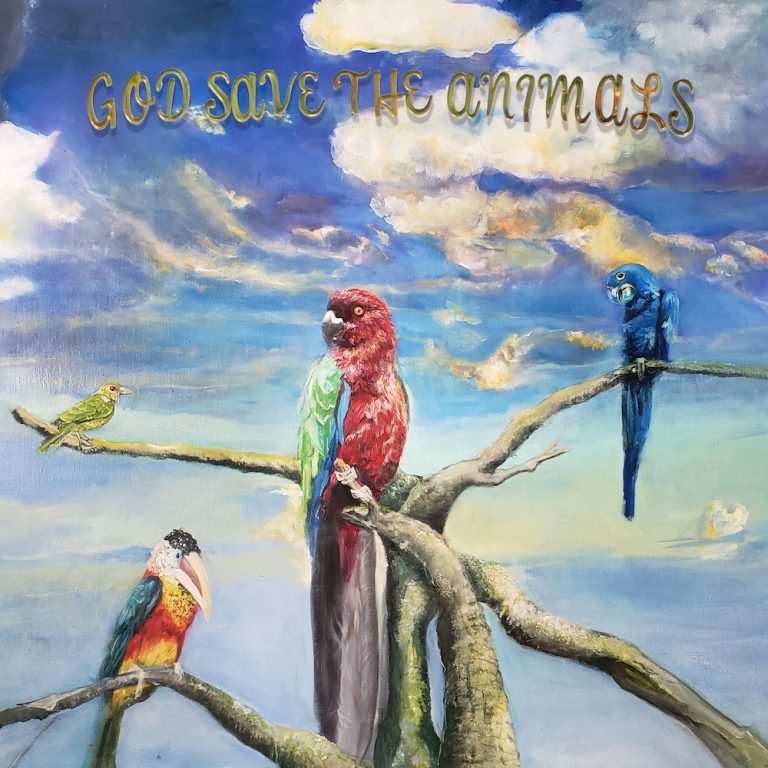Throughout his early work, including 2015’s Beach Music (his initial release with Domino), the PA-born Alex G navigated laptop-punk and bedroom-pop templates, epitomizing a DIY aesthetic. Drawing from diverse sources – including Elliott Smith’s and The Microphones’ avant folk, Pavement’s idiosyncratic pop, Animal Collective’s iconoclastic gestalts, and Deerhunter’s noisy yet hook-informed forays pre-Halcyon Digest – Alex G made various shifts from album to album, honing his songwriting and production skills.
In fact, it’s difficult to discuss Alex’s talents as a singer-songwriter without also discussing his flair as a producer. The two skill sets have evolved concurrently and, for the most part, complementary. 2017’s Rocket was a pivotal project. In terms of melody, the saloon-ready “Proud” and bluegrass-inflected “Bobby”, for example, anchored within relatively conventional parameters, contain two of Alex’s more memorable hooks. Still, glitchy songs such as “Horse” and “Witch” reasserted his lo-fi and cacophonous leanings, the album as a whole juggling and frequently reconciling accessibility and textural outsider-ism.
On 2019’s House of Sugar, Alex continued to explore the relationship between songcraft and sonic locale. “Taking” combined folkish strums and sitar-like overlays, splashy vocals draped over a hazy mix. The track is melodically and atmospherically compelling. With “Near,” too, Alex streamlined his production MO and attention to melody. Guitars and beats are interwoven; surreal accents and flourishes emerge. The track stands as a consummate song, per se, while the tightly collaged ambience is equally enticing.
Each track on his new album, God Save the Animals, offers a distinct melody contextualized by notably controlled production moves. In this way, God Save the Animals is the most pop-adherent and, in terms of production, restrained project in Alex’s oeuvre. Opener “After All” is a master class on melody while the track’s textures are relatively contained, a piano part offering rhythmic accents and minimalist runs. “People come and people go away / yeah but God with me he stayed,” Alex sings, voicing the importance of faith (that can be taken in a secular and/or religious sense). The track is one of Alex’s most stirring pieces, destined for inclusion on song-of-the-year lists.
With the folksy “Mission”, Alex gives himself credit for the things he’s done right (“I did good I kept it on track”) while acknowledging that in some respects he spent much of his past in the clutches of a conditioned trance (“I was asleep like a child / I walked the idiot mile”). In this way, God Save the Animals is a strikingly reflective project, Alex assessing his attachments and egoic ties, how they have, perhaps, yielded worldly rewards but also led to emotional entanglements and entrenchments that could have been avoided. In this sense, he implicitly comments on a world that exploits the instinctive drives, that can remain viable only if the consumeristic impulse is sustained and stoked (hence, the album’s prayerful title).
“No Bitterness” is built around an enthralling palimpsest of lead and back-up vocals textured by swingy drums, trippy phase-shifts, and psychedelically-tinged instrumentation. As the piece unfurls, it grows more chaotic, reminiscent of earlier work, while never losing its immediacy or transportive effect. The mesmerizing “Cross the Sea” combines vocals that are gently delivered but loudly recorded, undergirded by acoustic accents and offset by bouncy drumbeats. “Blessing”, with its anthemic melody and militaristic rhythms, evokes a post-apocalyptic feel (“Every day is a blessing / as I walk through the mud”) while “Immunity” is an otherworldly and quin-pop take on the stoner/diaristic postcard. Alex’s voice is delicately delivered; as with “Cross the Sea”, however, loudly recorded. The track emanates a persistent volatility, as if the audial field can barely contain the mix.
Closer “Forgive” straddles the ground between unplugged singalong and nondenominational hymn. Alex’s voice, buoyed by a strummy acoustic, bright banjo, and busy drums, is alternately strained to the point of tears and indicative of a hard-won equanimity (“Forgive yesterday / I choose today”). He acknowledges that it is perhaps human nature (and not necessarily a tragedy) to “build castle upon castle upon castle upon air”. We’re hardwired to invent realities, doing so as much to remain enthused with life as to perpetuate enduring states of denial.
God Save the Animals’ production approaches are understated compared to those employed in previous work yet still precisely rendered. What stand out – prominently and unabashedly – are Alex’s impeccably crafted and irresistibly delivered songs. Throughout the sequence, Alex extends compassion and forgiveness to himself and the world, conjuring a sense of engaged acceptance, that while there’s always need for improvement, there may indeed be truth to the maxim that people, individually and collectively, are essentially good.


